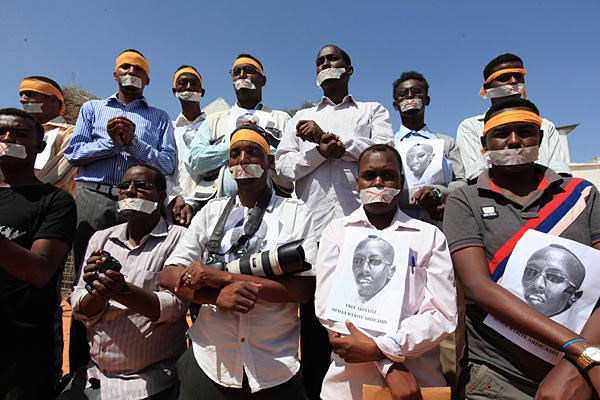Hiiraan Online
Tuesday, May 3, 2016

MOGADISHU (HOL) – Despite improving security in the Somali capital, Somali journalists continue to face mounting challenges including killings, threats, and arbitrary detention by authorities and
militants in the horn of Africa nation, rights group said Tuesday.
In a 74-page report, “‘Like Fish in Poisonous Waters’: Attacks on Media Freedom in Somalia,” Human Rights Watch said that Somali federal government and regional authorities have used various abusive tactics to affect media coverage, including arrests and forced closures of media outlets, threats, and occasionally, criminal charges.
Al-Shabab has also targeted journalists as part of its campaign against the Somali government and for reporting deemed unfavorable. Government authorities have failed to adequately investigate and prosecute those responsible for abuses, leaving journalists to live in fear, the new base agency said.
“Media freedom shouldn’t be yet another fatality in Somalia,” said Laetitia Bader, Africa researcher at Human Rights Watch. “On top of the long-term threats from Al-Shabab, the new government is increasing the danger and repression for journalists at the very time when their services are most needed.”
Both Al-Shabab and the Somali government and its allies have sought to exploit the vulnerabilities of the largely unpaid and inexperienced journalists throughout the country’s long conflict, Human Rights Watch found.
“Each side has pressured journalists about their reporting, manipulated casualty figures, and obstructed reporting, greatly affecting the media environment. Dozens of journalists have fled into exile over the last decade.” The report issued on World Press Freedom day said.
One journalist who survived an attack in Mogadishu in October 2014, had no doubt he was the target: “I could hear several voices telling the shooter to aim better. I could hear them saying, ‘He is still alive!’” He was wounded so seriously that he can no longer work as a reporter.
According to the report, government officials have regularly sought to justify restrictions on media freedom by claiming that the media are acting unprofessionally or on national security grounds. Notwithstanding the difficult security and political context, the authorities have tried to curtail legitimate news coverage using tactics that often place journalists at risk of reprisals, Human Rights Watch found.
In addition, the lengthy report said that Al-Shabab unlawfully treats journalists, who are civilians under the laws of war, as extensions of the Somali government or foreign military forces. The group has used threats and violence against journalists to coerce positive coverage.
Hopes that new authorities in Mogadishu, Puntland, and the newly-created interim regional administrations would bring justice for abuses against journalists have been dashed, Human Rights Watch said.
The federal government has only investigated and prosecuted attacks on journalists attributed to Al-Shabab, relying on the national intelligence agency, which has no law enforcement mandate, and the country’s military court, whose trials do not meet international due process standards.
Three people were sentenced to death and executed in April 2016 for their alleged involvement in killing six journalists. Human Rights Watch said it identified due process violations during the recent trials that undermined the defendants’ rights to a fair trial.
"No government official is known to have been prosecuted or disciplined for attacks, threats, mistreatment, and unlawful detention against journalists." it said.
The problematic trials and one-sided investigations, which leave survivors subject to reprisals, foster an enduring fear among journalists. Many told Human Rights Watch they saw no point in even reporting incidents to the police since they would not pursue the attackers and going to the police puts the victims at further risk.
In January 2016, President Hassan Sheikh signed off on a new media law that risks further hampering freedom of expression, Human Rights Watch said. While the law has some positive aspects, it includes many vague restrictions on the media. The new law is likely to prompt further self-censorship as journalists are unable to determine what conduct is criminalized.
“Somalia’s government leaders should unequivocally condemn attacks against journalists and media workers and carry out prompt, transparent, and impartial investigations, Human Rights Watch said.
“They should commit to full, open reporting on issues of pressing public interest and amend or revoke laws that restrict the right to freedom of expression and the media. International donors should press the Somali government to protect journalists from abuse, review relevant laws, and provide technical assistance to ensure rights-respecting criminal investigations. “ the report said.